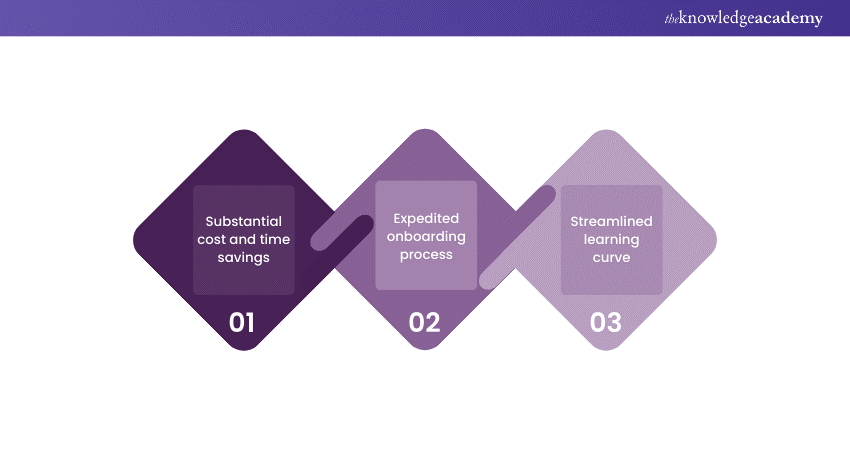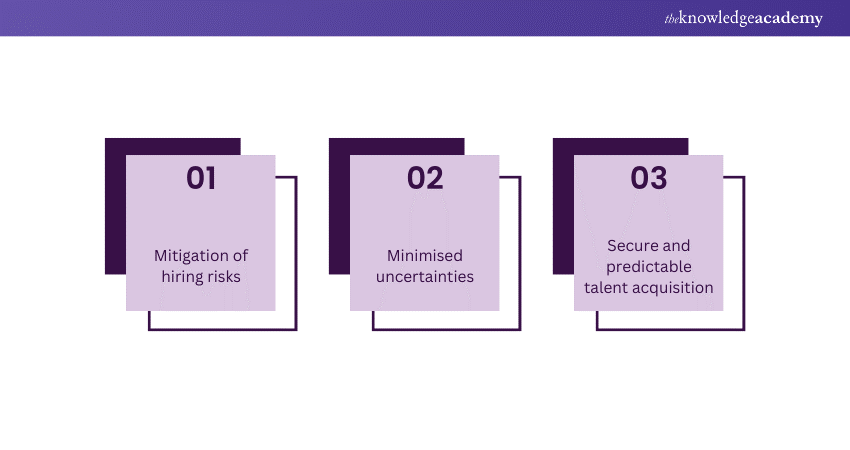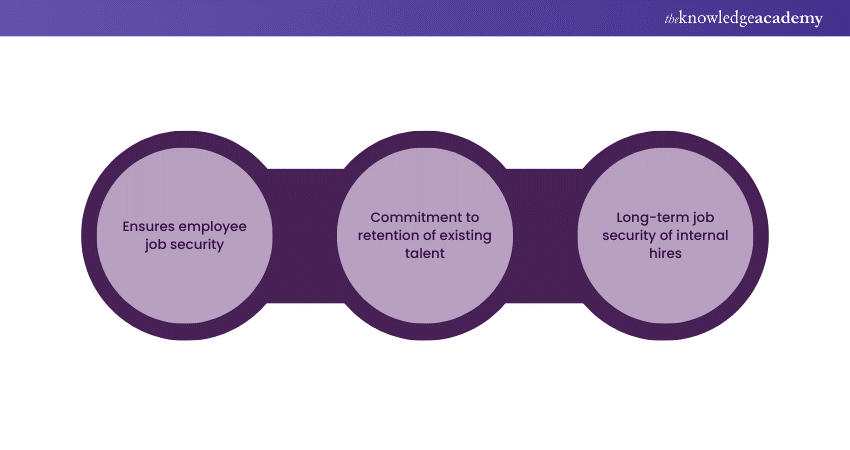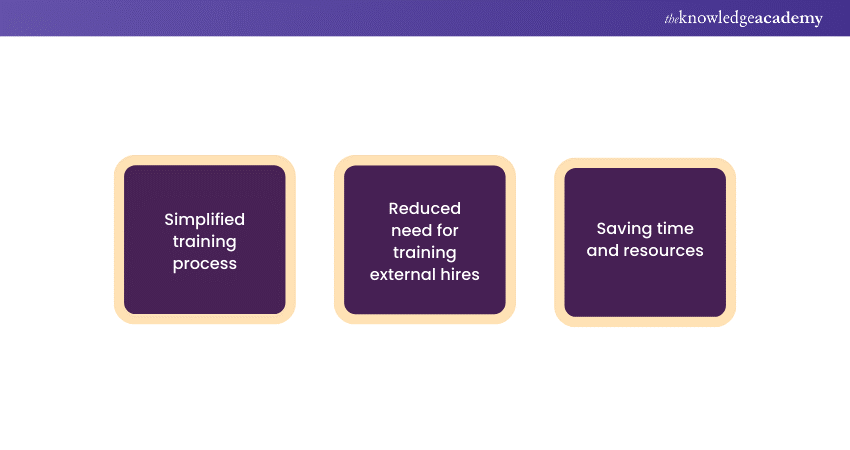We may not have the course you’re looking for. If you enquire or give us a call on +91-181-5047001 and speak to our training experts, we may still be able to help with your training requirements.
Training Outcomes Within Your Budget!
We ensure quality, budget-alignment, and timely delivery by our expert instructors.

Organisations are increasingly recognising the benefits of Internal Recruitment in their talent acquisition journey. This approach involves identifying and promoting existing talents to fill crucial roles, leading to advantages that go beyond traditional hiring methods.
Internal Recruitment is essential in shaping a strong and loyal workforce, from cost-efficiency to cultural preservation. This blog aims to help you understand the top Advantages of Internal Recruitment, which include cost and time savings, improved employee retention, cultural preservation, and streamlined onboarding.
Table of Contents
1) What is Internal Recruitment?
2) Key Advantages of Internal Recruitment
a) Cost and Time Savings
b) Enhanced Employee Retention
c) Cultural Preservation
d) Streamlined Onboarding
e) Mitigation of Hiring Risks
f) Attainment of Workforce Planning Objectives
g) Provision of Employee Growth Opportunities
h) Ensuring Employee Job Security
i) Increased Engagement
j) Simplified Training Processes
3) Internal Recruitment Done Right with Software
4) Conclusion
What is Internal Recruitment?
Internal Recruitment is the process of hiring from the organisation's present workforce. It may take the form of promotion, transfer, employee referrals, or from converting the temporary employees to permanent or full-time employees. A structured hiring system for internal candidates will save the process from becoming time-consuming in filling the vacancies.
In fact, this internal talent helps to smooth transitions from company culture by using the skills that have been developed and capitalising on knowledge of the way processes work. The above is what develops and retains employees since it gives an overview of opportunities to grow and advance within the organization. Overall, internal recruitment strategies remain a beneficial approach that enhances efficiency, improves engagement with employees, and contributes to the success of the company in the long run.
Key Advantages of Internal Recruitment
Internal Recruitment is a process involving the identification and promotion of existing employees to fill vacant positions within an organisation. It emphasises nurturing talent from within, fostering employee loyalty, and reducing hiring costs.
This approach ensures a smooth transition for individuals already familiar with the company’s culture and operations. Below are the various Advantages of Internal Recruitment, described in detail:
1) Cost and Time Savings

Internal Recruitment offers immense cost savings and time value for any organisation. This is because the process of Internal Recruitment saves a number of costs for business enterprises, which otherwise, they have to incur for recruitment from outside in terms of advertisements and recruitment agency fees.
This also speeds the onboarding, considering that home-grown talents are already conversant on how the organisation runs its things, therefore shortening the learning curve. The overall cost of recruitment is, therefore, minimised to large extents, and the time taken for new employees to merge into their roles is fast-tracked to be operational, which means efficiency and a quicker return on investment.
2) Enhanced Employee Retention
Internal recruitment increases the retention of employees by a large margin because it leads to loyalty and commitment. If internal promotions are taking place before their eyes, this is going to give them the motivation to see a career within the organisation in the long run.
This investment in their professional development becomes a virtuous cycle, decreasing turnover rates and their associated costs. A clear career path and opportunities for growth represent motivators to hold employees in their place, developing an experienced and constant workforce, something that further reinforces the organisational success and its continuity.
3) Cultural Preservation
Internal Recruitment plays a vital role in cultural preservation within organisations. By promoting from within, companies ensure that employees ascending the ranks are familiar with the company's values, mission, and dynamics.
Additionally, this intrinsic knowledge contributes to preserving the unique organisational culture, fostering a cohesive and harmonious workplace. Internal hires seamlessly align with existing cultural norms, promoting unity and shared objectives. This is crucial for maintaining a positive work environment and sustaining the distinctive identity that sets the organisation apart.
Join our Food Hygiene and Safety Training and learn how to analyse all potential food hazards or anything that might hurt the consumer.
4) Streamlined Onboarding
Internal Recruitment facilitates streamlined onboarding processes, expediting the integration of promoted employees into new roles. As existing staff members, internal hires are already familiar with the company's policies and procedures, significantly reducing the time consumed and resources typically spent on orientation.
Moreover, this accelerated onboarding results in a quicker adaptation to new responsibilities, minimising disruptions to workflow. The seamless transition allows internal recruits to contribute effectively from the outset, promoting operational efficiency and ensuring a swift return on the organisation's investment in talent development.
5) Mitigation of Hiring Risks

Risk mitigation is effective; internal recruitment uses known entities. In this case, hiring managers are much more informed about the performance, work ethic, and cultural fit of the candidate in his or her department.
This equally minimises the uncertainties that are linked with hiring from outside, hence the risk of mismatching expectations. Internal candidates also have prior knowledge of organisational processes; thus, there is less chance of on-the-job challenges.
Internal Recruitment is, therefore, an attempt to tap strategically into an already proven pool of talents in a manner that minimises risks but ensures more security and predictability for the organisations in talent acquisition.
6) Attainment of Workforce Planning Objectives
This forms an important tool for the organisational workforce planning objectives in meeting the aspirations of strategic goals. The organisation must, therefore, be able to identify and develop talent from within in order to meet the organisational goals.
This approach ensures a seamless transition in leadership roles and supports succession planning initiatives. Internally developed talent also allows for targeting the skill development and, generally, an attuned workforce not only to current objectives but to those of the future. Lastly, internal recruitment becomes a strategic driver for achieving long-term workforce planning goals.
7) Provision of Employee Growth Opportunities
Internal recruitment serves as an opportunity for employees to grow within an organisation. Companies are seeking to take care of their staff by grooming them and ensuring opportunities for growing into other ranks through internal promotions.
This approach motivates all workers to plan clearly for their careers and inspires a culture of continuous learning and development. New challenges and responsibilities create a high level of motivation among internal candidates; hence, their skills and experiences become broadened.
Ultimately, this commitment to employee growth enhances job satisfaction and loyalty, contributing to a dynamic and forward-thinking organisational culture.
Cultivate diversity in your workplace by signing up for our Diversity Training now!
8) Ensuring Employee Job Security

Internal Recruitment plays a pivotal role in ensuring employee job security. By prioritising promotions from within, organisations communicate a commitment to retaining and developing their existing talent.
Such an approach gives employees a sense of stability, knowing their dedication and contributions are recognised. Internal hires are less susceptible to external market fluctuations, enhancing their confidence in long-term job security. This commitment to internal talent helps foster a positive work environment and contributes to sustained employee loyalty and organisational resilience.
9) Increased Engagement
Internal recruitment improves very strongly the perspective of employee involvement through a clear path offered for career progress. An employee who sees opportunity in the organisation for growth will be more involved and motivated.
It ensures that there is a future of internal promotions since an individual can be committed and loyal if he actively contributes to his professional development. Such increased engagement tends to make the workforce much more alive and hence productive. They create an environment for positive reinforcement where employees feel valued, motivated, and connected to organisational success.
10) Simplified training Processes

Internal Recruitment simplifies training processes by capitalising on existing employees' familiarity with the organisation. Internal hires are already well-versed in company policies and procedures, reducing the need for extensive training on fundamental aspects.
This streamlined onboarding allows for a more targeted and efficient training program, focusing on specific role requirements and skill enhancements. The result is a simplified training process that saves on time and resources while ensuring that employees quickly adapt to their new roles, contributing to overall organisational productivity.
Enhance employee engagement and compliance by signing up for our HR Courses now!
Internal Recruitment Done Right with Software
Using an ATS system can simplify your internal hiring strategy. For best results, choose a recruitment platform that's part of a talent management system. Managing the entire employee journey from one system makes Internal Recruitment tasks easier. Here's how a talent management system supports Internal Recruitment:
1) Evaluate internal hiring success with reports on promotions and retention.
2) Create Talent Communities to find internal candidates based on skills.
3) Use ATS Interview Guides and Scorecards to ensure fair processes.
4) Get insights from Performance Management, including reviews and feedback.
5) Make accurate workforce predictions and plan effectively.
6) Build your ideal system with modules for Recruiting, Onboarding, Performance, Engagement, and Workforce Planning.
Conclusion
Internal Recruitment offers numerous advantages, from boosting employee morale to reducing onboarding time and performance risks. By fostering employee growth and aligning with workforce planning goals, this approach not only supports organisational success but also nurtures a culture of resilience and engagement. Embracing Internal Recruitment is a strategic step toward building a thriving workplace.
Understand effective communication and strategic decision-making with our Leadership Courses – Sign up today!
Frequently Asked Questions

Recruiting internally can be beneficial as it boosts employee morale, reduces hiring costs, and shortens the onboarding process. Internal candidates are accustomed to the company culture and operations, making them quicker to adapt and contribute effectively.

To recruit internally, advertise job openings on internal platforms, encourage managers to identify potential candidates, and promote opportunities for career advancement. Holding internal job fairs, offering training programs, and recognising talent within the organisation can also support Internal Recruitment efforts.

The Knowledge Academy takes global learning to new heights, offering over 30,000 online courses across 490+ locations in 220 countries. This expansive reach ensures accessibility and convenience for learners worldwide.
Alongside our diverse Online Course Catalogue, encompassing 19 major categories, we go the extra mile by providing a plethora of free educational Online Resources like News updates, Blogs, videos, webinars, and interview questions. Tailoring learning experiences further, professionals can maximise value with customisable Course Bundles of TKA.

The Knowledge Academy’s Knowledge Pass, a prepaid voucher, adds another layer of flexibility, allowing course bookings over a 12-month period. Join us on a journey where education knows no bounds.

The Knowledge Academy offers various Recruitment Courses, including Recruiting for Success Training, Hiring Graduates Masterclass and Recruitment Assessment And Selection Training. These courses cater to different skill levels, providing comprehensive insights into Recruitment Process.
Our HR Resources Blogs cover a range of topics, offering valuable resources, best practices, and industry insights. Whether you are a beginner or looking to advance your Health & Safety skills, The Knowledge Academy's diverse courses and informative blogs have you covered.
Upcoming HR Resources – Learn about Human Resources Batches & Dates
Date
 Recruiting for Success Training
Recruiting for Success Training
Fri 14th Feb 2025
Fri 11th Apr 2025
Fri 13th Jun 2025
Fri 15th Aug 2025
Fri 10th Oct 2025
Fri 12th Dec 2025







 Top Rated Course
Top Rated Course



 If you wish to make any changes to your course, please
If you wish to make any changes to your course, please


